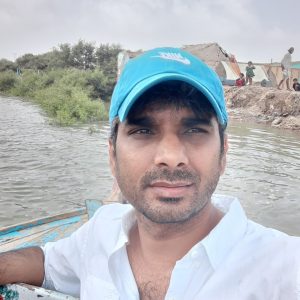Suneel Kumar is a fifth year ICON Ph.D. candidate in Anthropology whose work explores how past infrastructural, political, environmental and climate change histories have shaped the land-water configurations of the Indus River Delta in Pakistan. His work puts into conversation the geologic scale with the human scale and draws on geological anthropology, multispecies ethnography, and ontological anthropology to explore the delta as a generative force in human and nonhuman relations.

Kumar’s interest in the Indus River Delta as began during the drought of 2010, which severely impacted the deltaic region in Pakistan’s Sindh province, where Kumar resides.
“My hometown is very close to the Indus River,” Kumar explains, “and we would picnic by the banks of the Indus. It was where we would always go, and there are so many stories we have heard since childhood – about its waters and the gods and so many things – attached to the Indus.”
Kumar continues, “there had been a dry spell for five or six years before 2010, which resulted in almost no water flow in the Indus.” The extended drought led to a memorable day in January 2010, during which Kumar remembers people from all walks of life – “Hindus, Muslims, Christians, men, women, children from all levels of society, Indigenous people, people from NGO’s (non-governmental organizations) – were praying or doing rituals or making speeches in the bed of the Indus, and I was there observing.” In September of that same year the Indus experienced a mega-flood.
The familiarity of the Indus River and its patterns, as well as the 2010 drought and its subsequent mega-flood, would mark the beginning of Kumar’s current ecological and anthropological work as an ICON student.
“I wanted to understand the contesting narratives about how different groups of people – like the local Indigenous fisherfolk, non-Indigenous Pakistani society, and conservation and environmental organizations – actually understand the Indus in Pakistan,” explains Kumar. “I was, and I continue to be, interested in whose knowledge counts the most, and when or why some groups’ knowledge becomes more important than that of other groups, and why that happens.”

Kumar’s research has evolved as his time as an ICON student has progressed. “Rather than focusing on the whole Indus River, I now just look at the Indus River Delta, which is my field site,” says Kumar. “My research focuses on how the Indigenous fisher folk and the conservation organizations who are working in the Indus are trying to understand and conserve its ecology,” Kumar continues. “I’m examining how the materiality and physicality of the delta itself – its land and water configuration, and non-human actors like the mangroves and fish, shape the perspective of Indigenous people and conservation organizations.”
Kumar is less interested in how peoples’ perspectives shape the Indus Delta, and more interested in how, “when they try to engage with the Indus River Delta, the delta and its non-human societies shape those human actors.”

